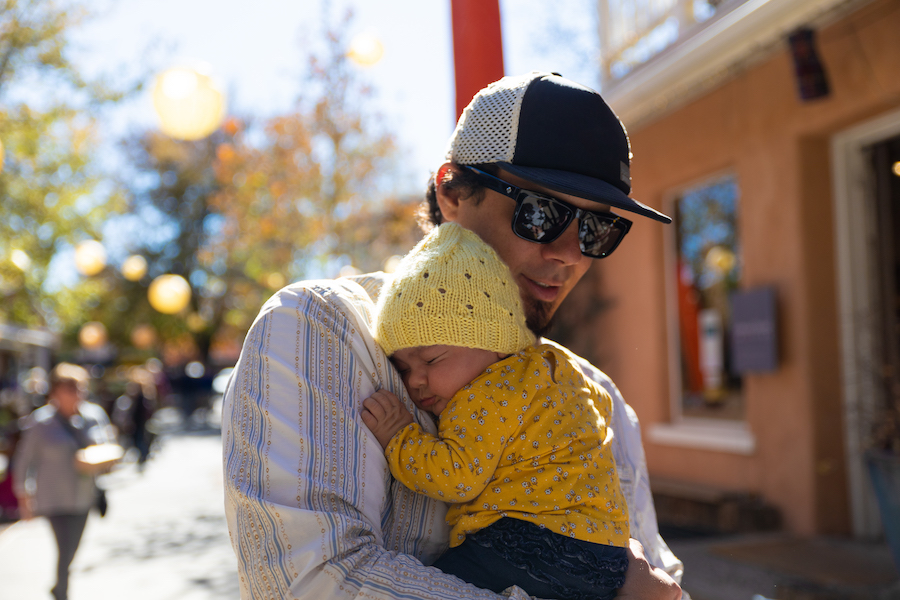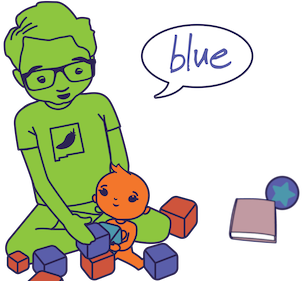
Updated on December 23, 2021
What Will My Baby Do Next? When to Expect Crawling, Walking, Words and More
Watching a baby or toddler do something new is one of the greatest joys of caregiving. Whether they are learning to roll over or taking a first step, little ones are always learning new skills.
Every baby is adorably unique, and develops at their own rate. However, experts know a lot about when most babies learn new skills. These new skills are called “developmental milestones,” and you can watch for your baby to start reaching these milestones as they grow.
We put together a quick list for New Mexico families of some of the cutest milestones we could find. If you’d prefer to just look at a list of key milestones by age, you can access that here.

1-3 Months – Smile Time
 During this time, many babies will give the gift of their first real smile. This is not to be confused with their reflex smiles in the first few weeks of life, which most experts think don’t reflect true feeling. (There’s some disagreement about that, though, so if your newborn smiles at you, feel free to imagine that they mean it!)
During this time, many babies will give the gift of their first real smile. This is not to be confused with their reflex smiles in the first few weeks of life, which most experts think don’t reflect true feeling. (There’s some disagreement about that, though, so if your newborn smiles at you, feel free to imagine that they mean it!)
In any case, most babies smile on purpose by the time they are three months old. Experts call this their “social smile.” Besides making your day, social smiles signal healthy bonding and development. Other key milestones during the first three months include: Lifting their head up while on their tummy, reacting to sudden movements or sounds, adorable cooing, following movement with their eyes, and grasping a small object placed in their hand.
3-6 Months –Babble
During this time, most babies start to make babbling sounds. The first ones will probably be vowel sounds like “ee” or “uh.” When this happens, talk back! Even though your baby isn’t making words yet, having back-and-forth “conversations” with caregivers is good for babies’ brains (and very fun). Other milestones during these months include: Lifting head and chest when on the tummy, trying to roll over, trying to reach and hold objects, seeming to recognize familiar objects and people, and sometimes laughing (the best).
6-9 Months – Peek-a-Boo
Around this stage, many babies can start to play simple games like peek-a-boo and pat-a-cake. Games like this are a great way to bond with your baby, and are fun and easy ways to connect with your child. You can also watch how babies of different ages respond to peek-a-boo as they grow. Other milestones around this time include: Rolling over, self-feeding simple foods like a cracker, knowing strangers from family, sitting without support when placed in a sitting position, and beginning to creep on their tummy. And that creeping leads into the next big change …
9-12 Months – On the Move
Once a baby crawls, nothing is ever quite the same. It used to be that you could set your baby down somewhere, look away, and they would still be there when you looked back. No longer. Watching babies start to creep or crawl is exciting for families, even though it means you have to up your baby-proofing game (in a room full of safe and colorful toys, how do babies always find the single pebble that you missed?) Other milestones during this time include: Pulling up to a sitting or standing position, picking things up with thumb and forefinger, knowing their own name, and copying simple words like “Mama” and “Dada.”
12-15 Months – Steps!
For most babies, first steps will happen during this time. Learning to walk is a special move toward independence for your baby, and can be joyful to watch as a parent. During this time you may stop thinking of your little one as a baby, and start coming to grips with having a toddler on your hands. Other milestones during this time include: Starting to use a spoon for eating, turning book pages (a few at a time), saying more words besides “Mama” and “Dada,” and understanding more of what is being said to them.
15-18 Months – More Words
 During this time, toddlers often start imitating and using more words. They can also show their understanding of words they don’t yet say, by pointing at simple pictures of things like a dog or a car. They may start using these new communication skills to ask for help when they need it. Other milestones include: Scribbling with crayons, pushing and pulling toys, walking more steadily (and learning stairs!), and imitating simple actions they see adults do, like cleaning.
During this time, toddlers often start imitating and using more words. They can also show their understanding of words they don’t yet say, by pointing at simple pictures of things like a dog or a car. They may start using these new communication skills to ask for help when they need it. Other milestones include: Scribbling with crayons, pushing and pulling toys, walking more steadily (and learning stairs!), and imitating simple actions they see adults do, like cleaning.
18-24 Months – No!
Although “No” is often one of the first words babies know, the toddler stage is when they really embrace it. This is when you can expect your toddler to start voicing opinions about how their day should go, and saying “No,” when you tell them it’s time for bed (or to put on their shoes, or to eat their chicken …) This is also when most toddlers start stringing words together into thoughts, like “Me want cookie,” or maybe “No bed.” This stage can be challenging, but know that it’s normal and there are strategies to try. Other milestones during this time include: Walking well and beginning to run, recognizing themselves in the mirror, and enjoying moving to music (and dancing is one of our favorite of the seven steps).
24-30 Months – More Independence
During this time, toddlers can start to master more skills, like helping to dress and undress themselves, and feeding themselves well with a spoon. Their developing bodies can now jump, run, and kick a ball, and they know their bodies well enough to correctly point to four or five body parts. During this time, toddlers are also starting to speak in short sentences and name objects they see in books. Other milestones include: Turning book pages one at a time, knowing some colors, and playing with other children for short periods of time.
30-36 Months – Big Kid
As your little one transitions out of the toddler phase (they probably run now, with no wobble at all), they show a lot of “big kid” skills, such as putting on shoes without laces, brushing their teeth with help, and starting to ask about or use the potty. Kids this age are starting to tell stories, learning to share, and playing pretend games with other children. The end of the toddler years can be bittersweet, but also opens new opportunities.
As your child turns three, they will become eligible for New Mexico PreK, a free program to help 3- and 4-year-olds develop the social, emotional, and learning skills that will help them be ready for kindergarten. You can search for PreK in your area here, or call 1-800-691-9067 to speak with an expert on finding early childhood services in New Mexico.
Want to Know More?
Every child develops differently, and your family’s caregiving journey is unique. If you aren’t sure your baby is reaching their milestones, or just have questions about their development, New Mexico offers a free program that can help. The program is called Family Infant Toddler (FIT for short). Through FIT, an expert in child development can help you assess whether your child is developing on time. If you determine together that your child would benefit from services such as physical therapy or speech therapy, these services will be provided in your home (or virtually) at no cost to you.
FIT services are available for families from birth to age three, and are always completely free. If you have any concerns about your child’s development, contact the FIT Program at 1-877-696-1472 to speak with an expert who can help you think about next steps for your family. To learn more, consider starting with the New Mexico FIT Family Handbook, a guide for families starting out with FIT. Even if you aren’t sure your child has a delay or challenge with their development, it is better to check it out early.
Did you find this article helpful?
Subscribe to Bright By Text to get more free tips and resources for your child’s journey, right to your phone!
